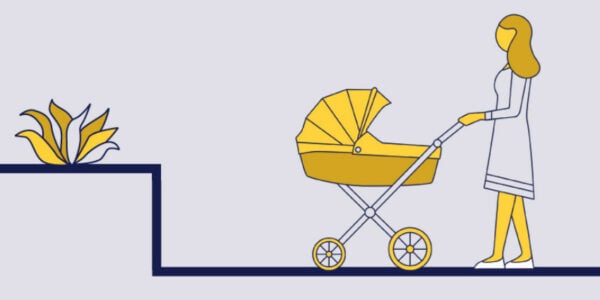New research has revealed that pregnant women living in Wales who are at risk of their babies being removed from their care in the first year of life are far more likely to have had mental health problems compared to other pregnant women.
The ‘Born into care: One thousand mothers in care proceedings in Wales’ research report, published by Nuffield Family Justice Observatory (Nuffield FJO), discovered that over half (53 per cent) reported an existing mental health condition at their initial antenatal assessment, and over three-quarters (77 per cent) had a GP or hospital contact or admission related to mental health at some point prior to their child’s birth. The report findings also challenge the assumption that mothers who become involved with children’s services avoid or delay interaction with antenatal services – with almost two-thirds (63 per cent) having made contact by the end of the first trimester of pregnancy.
In Wales, the number of infants appearing in care proceedings at birth, or in the first year of life, is increasing*, and there is growing recognition that parents need to be supported pre-birth if these numbers are to be reduced.
‘Born into care: One thousand mothers in care proceedings in Wales’ focused on over 1,000 birth mothers whose babies appeared in care proceedings before their first birthday, looking back at maternal health and well-being in and before pregnancy, interaction with maternity services, and birth outcomes, benchmarked against other pregnant women in the general population. The study was commissioned by Nuffield FJO and undertaken by the Family Justice Data Partnership – a collaboration between Lancaster University and Swansea University – and is the first to link family court records to maternal health data in Wales, enabled by the SAIL (Secure Anonymised Information Linkage) Databank.
Findings of the report
The findings on mental health are striking. Over half (53 per cent) of the pregnant women at risk of care proceedings reported an existing mental health condition at their initial antenatal assessment – compared to 17 per cent in the comparison group. Over three-quarters (77 per cent) had a mental health-related GP or hospital contact or admission recorded in their health records prior to their child’s birth – twice the proportion of pregnant women in the general population (38 per cent).
In addition, 38 per cent had a GP or hospital contact or admission relating to substance use before their child’s birth (compared with six per cent in the general population group), and 63 per cent were smokers at booking and 60 per cent at childbirth (compared to 17 and 15 per cent, respectively, of mothers in the comparison group).
Despite the multiple health and well-being issues, babies of mothers at risk of care proceedings do not appear to be significantly less healthy than their peers at birth (97 per cent were in a good physical condition immediately after birth, compared to 99 per cent of babies born to mothers in the comparison group). Slightly more were born pre-term and with low birth weights.
The report also provides new statistics on how mothers of children involved in family court proceedings interact with maternity services. Anecdotal evidence suggests this particular group of women delay contact, or may even conceal their pregnancy out of fear that children’s services will remove their baby at birth. However, the findings challenge this assumption, with a significant proportion of mothers interacting with antenatal services at a timely point.
Almost two-thirds (63 per cent) had booked an initial assessment by the end of the 12th week (compared to 87 per cent of mothers in the comparison group) – sufficiently early in pregnancy to enable timely intervention and support. Only five per cent reported a very late initial assessment at or after 30 weeks.
‘Born into care: One thousand mothers in care proceedings in Wales’ aims to provide information to help shape future provision and policy, improve pre-birth support, and, ultimately, deliver better outcomes for children and families. The key message from this study is that women’s mental health needs must be far more central in pre-birth assessment and support.
Lisa Harker, director of Nuffield FJO, said:
“These new findings show that the sharp rise in the number of babies being taken into care is as much a mental health crisis as it is a parenting crisis. It underscores the need – and highlights the opportunity for – timely and enhanced support. If help can be provided to women, especially when they report with health concerns early in pregnancy, it may be possible to reduce the number of infants taken into care.”
Dr Lucy Griffiths from Swansea University and Professor Karen Broadhurst from Lancaster University are two of the authors of the report.
Dr Lucy Griffiths said:
“Welsh policy makers and practitioners require an evidence-informed picture of families involved in the family justice system in order to tailor services more closely to their needs, and to make the best decisions. Previously, very little was known about mothers in care proceedings in terms of their overall health and well-being before or during pregnancy, pregnancy outcomes, engagement with antenatal services or age profiles. This report, the third in the ‘Born into care’ series, provides a better understanding of the needs and vulnerabilities of mothers, and will help guide the intervention that might be needed. It also sets the scene for more in-depth analyses; further insights on child and maternal health soon after birth and in the longer term are needed, especially given evidence that a history of mental health during pregnancy, as well as substance use, can increase the risk of poorer child
outcomes.”
Professor Karen Broadhurst, co-director of the Family Justice Data Partnership, said:
“Local authorities in Wales are moving towards an earlier pre-birth response to all families referred to children’s social care services – and establishing a consistenly timely response, in the first trimester of pregnancy, is critical. It is really promising that a sizeable proportion of birth mothers engage with antenatal services at this point – it provides a clear window of opportunity for intensive, early engagement. Our study shows that maternal mental health must be given greater priority in pre-birth assessments and in therapeutic intervention in pregnancy. Consultation with the practitioners who deliver these services, such as social workers and midwives, is an important next step to assess whether practitioners feel able to identify and respond to these issues, and to determine any professional training.”
‘Born into care: One thousand mothers in care proceedings in Wales’ follows the Nuffield FJO ‘Born into Care: Wales’ report, published in October last year by the same research team, which revealed the scale and rising numbers of babies subject to care proceedings in
Wales, notably in the first year of life. It prompted questions about the reasons behind these increases, and what could be done to prevent infants being removed from their mothers’care.
Nuffield FJO and the research team will host a virtual roundtable on June 18 to discuss the findings with health and social care professionals and strategic leads. Consultations to discuss the report’s findings will be ongoing over the next year.
*Alrouh, B. et al. (2019). Born into care: Newborns and infants in care proceedings in Wales. London: Nuffield Family Justice Observatory.






